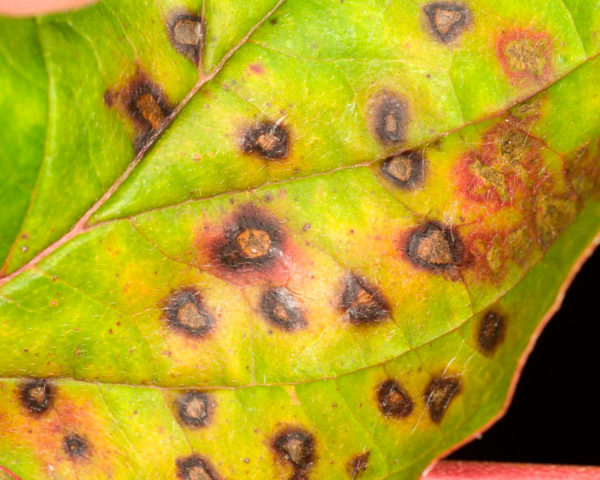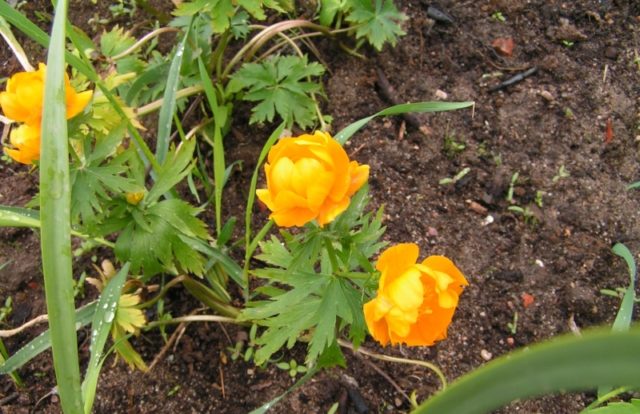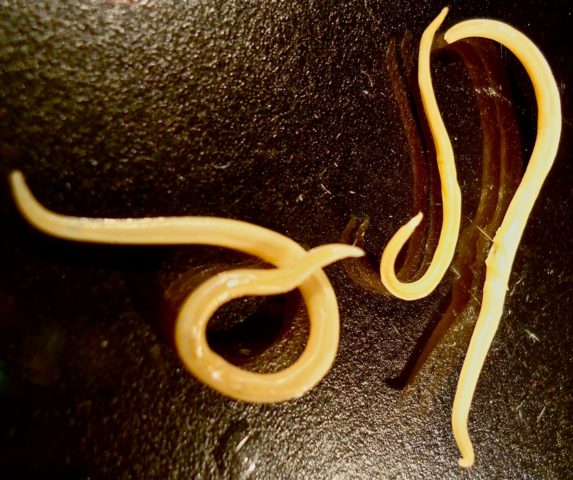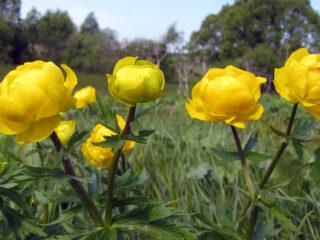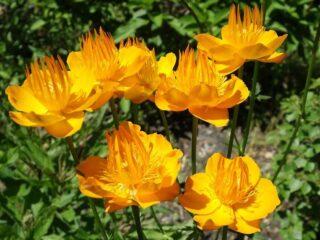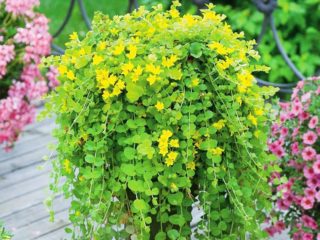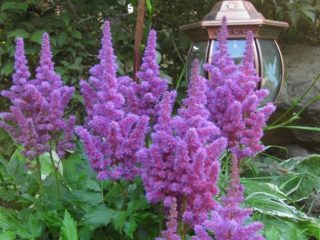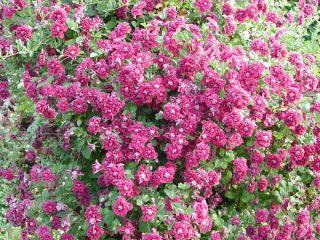Content
The Asian bather is an attractive decorative flower. Due to the bright color of the buds, the plant is called "fire". On the territory of Siberia, the culture is called "frying" (in the plural), in Altai - "frying lights".
Translated from German, the name "Trollblume" sounds like "troll flower". According to a beautiful Scandinavian legend, fairy-tale creatures love these flowers most of all - a bright, fiery tone. In the light of the June moon, magical elf trolls brewed a potion for youth without using fire in a globular gold dish. To prevent morning dew from getting into the potion, the vessels with the elixir were placed on poles. After sunrise, the mysterious elves poured the drink into bottles, and the empty golden dishes turned into beautifully beautiful swimsuit flowers.
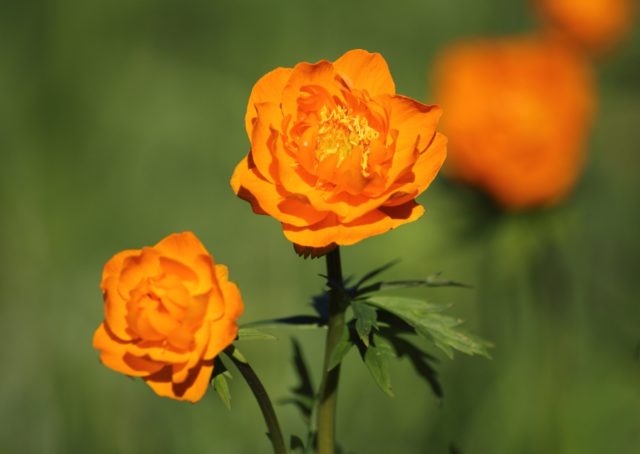
Modern gardeners with great success use the Asian swimsuit (Trollius) for decorating the local area
Description of Asian swimsuit
According to the classification, the Asian swimsuit (Latin Trollius asiaticus L.) belongs to the Buttercup family (Ranunculaceae). It is impossible to take your eyes off the bright yellow colors of the flowers of this decorative culture.
The Asian swimsuit has distinctive features:
- root system - cord-like lobes without the main root;
- stem, smooth, erect, simple or branched;
- stem length from 10 to 80 cm;
- stem leaves are pentagonal, with long petioles, from 1 to 5 pieces on each shoot;
- the color of the leaves is bright green;
- flowers are large, with 10-20 broadly elliptical petals;
- stamens short, widened upwards from the base and pointed towards the apex;
- flower diameter up to 5 cm;
- the number of buds on each bush is up to 5-10 pieces;
- inflorescence color orange-red;
- flowering - May-June;
- fruits - leaflets, up to 10 mm long with a short, inwardly curved nose.
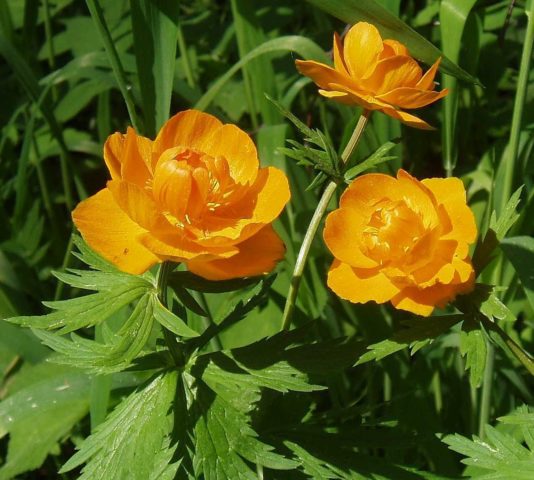
The plant is pollinated by bees, flies, beetles
The distribution area of the Asian swimsuit
In its natural environment, the Asian swimsuit lives in Siberia (eastern, western, middle regions), Mongolia and Altai. In the wild, frying occurs in spacious forest glades, flood meadows, as well as in the harsh tundra and mountainous terrain at the level of the alpine belt (at an altitude of up to 2800 m).
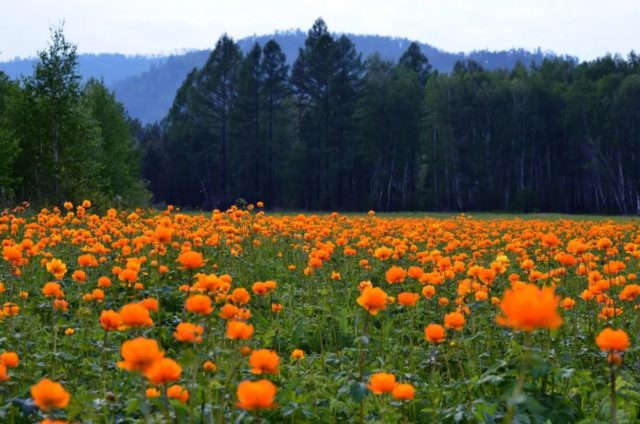
Colorful fry or Asian swimsuit is a visiting card of the Altai Floristic Reserve
The threat of extinction
At present, the bright and original Asian swimsuit (lights, fry) is being barbarously exterminated by man. The plant's official status is protected, rare. Culture is listed in the Red Book of such territorial units:
- The Republic of Sakha (Yakutia);
- The Republic of Buryatia;
- Yamalo-Nenets Autonomous District;
- Khanty-Mansi Autonomous Okrug;
- Omsk region.
Abundant natural plantings of the Asian swimsuit (Trollius) are rapidly disappearing near populated areas as people use the plant for cutting into bouquets.
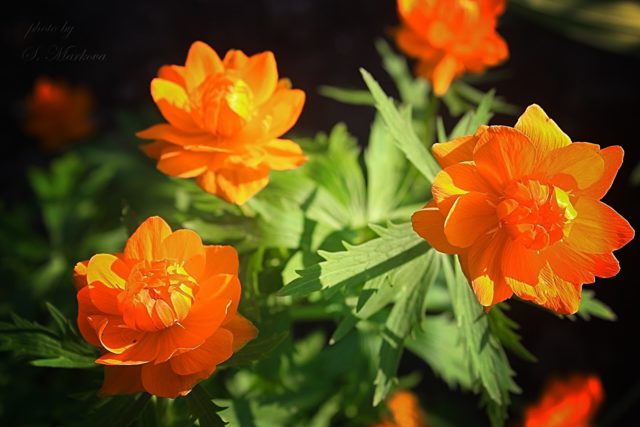
Gardeners love the culture of the "Siberian rose" for the inimitable resemblance of buds to the "queen of flowers"
Application in landscape design
The early and bright bloom of the Asian swimsuit (Trollius) plays into the hands of landscape designers.Along with the colorful colors of tulips, daffodils, irises, peonies, the fiery spots of the decorative culture will look very original.
On stony soils, the plant perfectly coexists next to sedum, yaskolka and other ground cover crops.
Plus, Asian fry pairs well with flowering perennials:
- lilac;
- magnolia;
- spirea;
- bells;
- host;
- badan.
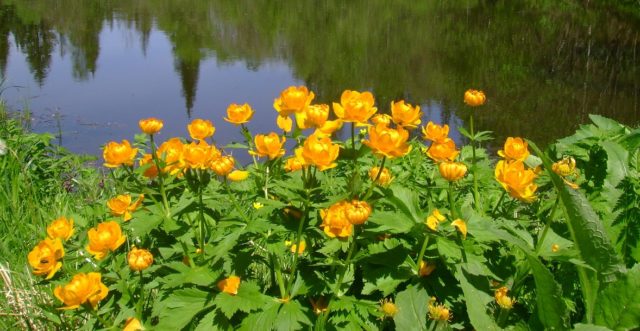
Lush blooming frying bushes will very nicely complement the storyline of the coast of a small reservoir
Reproduction methods
The Siberian Asian swimsuit reproduces in several ways:
- seminal;
- vegetative (cuttings, dividing the bush).
It should be remembered that with seed propagation, an ornamental crop can produce flower stalks only after a few years. The vegetative method allows you to enjoy the bright fiery colors of the Asian fire the next year.
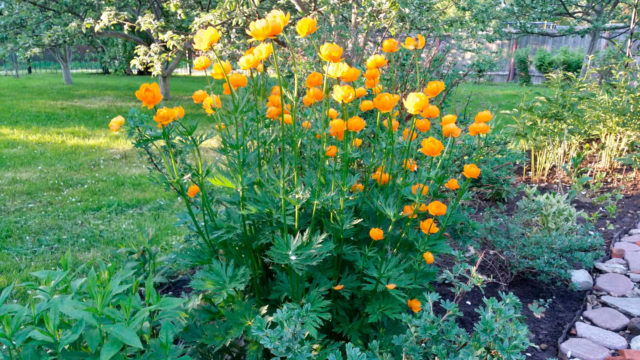
Dividing the bush is the most commonly used breeding method by frying
Seed method
The seed method of reproduction of an ornamental culture is not distinguished by complex agricultural technology. Ripe or purchased seed material of the Asian swimsuit (Trollius) is sown in open ground in August-October (depending on the climate).
The seeds of the Asian Siberian swimsuit are spread over the surface of the soil, sprinkled with a mixture of leafy earth, river sand and peat.
During the winter, the seeds are naturally stratified. The first shoots appear only by the end of May.
For seedlings of the Asian Siberian swimsuit, moderate watering and mandatory shading from the scorching sun is recommended.
After the appearance of the first pair of leaves, young seedlings of the Asian swimsuit dive or simply thin out.
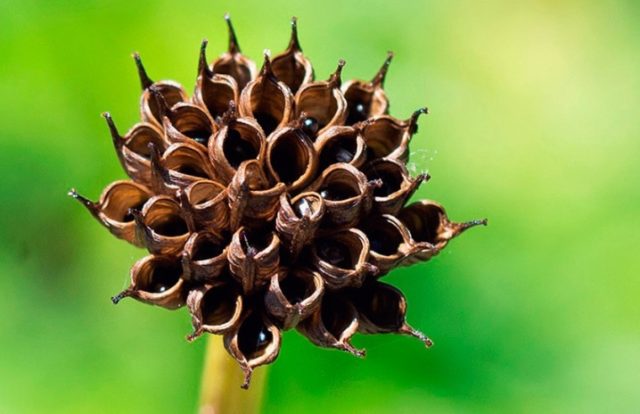
Siberian lights, propagated by seed, bloom only for 2-3 years of life
Cuttings
Cutting is a fairly successful breeding technique for the Siberian Asian swimsuit. After flowering, strong and healthy shoots located at the base of the bush are cut off. Cuttings of the Asian swimsuit (Trollius) can be treated with a root growth stimulant. Prepared shoots are placed for rooting in a mixture of sand, perlite and peat.
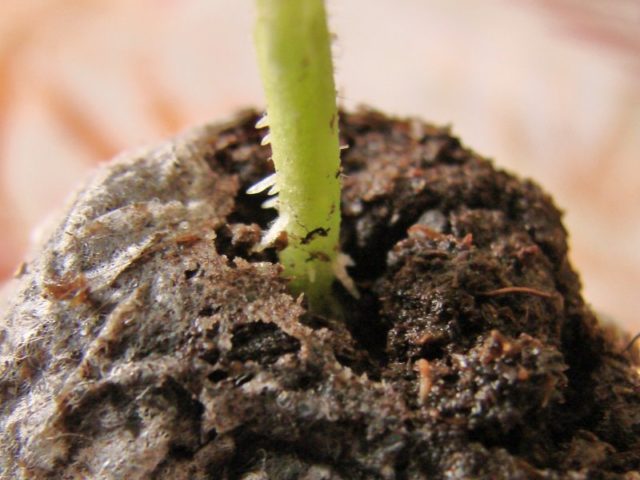
After final rooting, young frying bushes can be moved to a permanent place.
Dividing the bush
Dividing the bush is the simplest and most accessible breeding technique for the Asian swimsuit (Trollius) for every gardener. The procedure is carried out in the fall or spring.
The mother bush of the Asian Siberian swimsuit is completely removed from the ground, the root system is shaken off and washed.
With the treated garden tools, the root and shoots are divided into several parts so that each plot has 3-4 viable buds.
Places of cuts are treated with wood ash.
It is recommended to plant the plots of the Asian swimsuit (Trollius) on the same day in open ground, deepening the root collar by 2-3 cm.
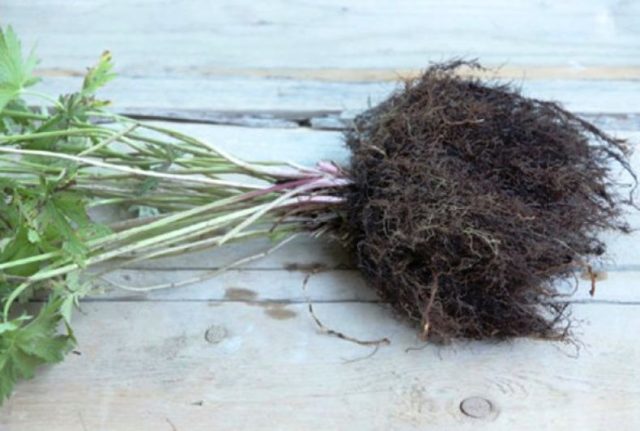
For reproduction by division, adult frying bushes are suitable (from 5 years of age)
Planting and leaving
The Asian swimsuit flower is an unpretentious decorative culture that successfully grows and develops in the wild without human intervention. On a personal plot, the plant should be given minimal care:
- watering;
- loosening the soil;
- weed removal;
- top dressing;
- elimination of pests;
- disease control.
Site selection and preparation
When choosing a landing site for an Asian swimsuit (Trollius), one should proceed from the requirements:
- a sufficient amount of sunlight or a slight partial shade from trees and architectural forms;
- well-drained, loose, fertile, preferably acidic soil with a lot of humus.
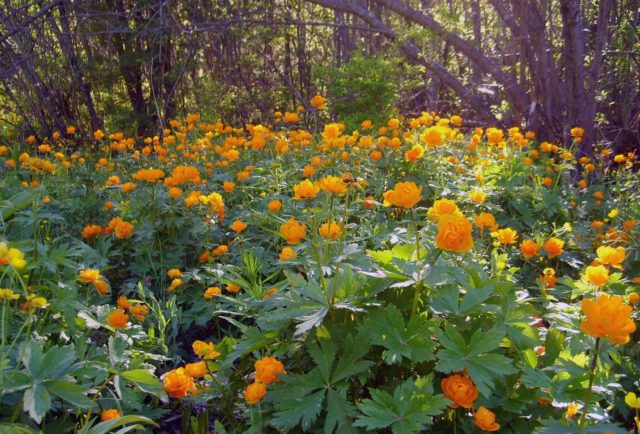
The ideal soil mixture for the growth of frying is considered a mix of leafy earth, peat, sand
Landing algorithm
The best time to plant a Siberian Asian swimsuit is early spring or mid-autumn. The optimum distance between planting holes is up to 40 cm. The size of the holes should correspond to the size of seedlings, plots or rooted cuttings.
How to transplant Asian lights to a permanent "place of residence":
- In the case of growing seedlings of an Asian swimsuit from seeds, the seedlings are carefully removed along with a lump of earth and planted in a new place.
- When transplanting cuttings of a swimsuit, young plants are also moved to the garden bed, without shaking off or washing the earth from the roots.
- Plots of the Asian swimsuit, obtained by the method of splitting the bush, should be replanted on the day the root system of the mother plant is distributed to prevent drying out.
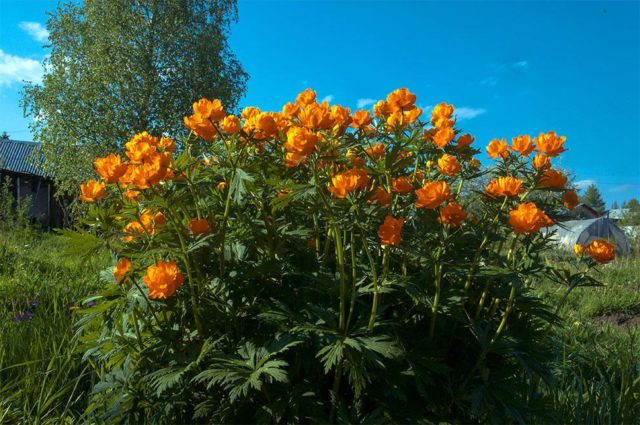
Experienced gardeners and florists recommend replanting Siberian lights to a new place every 5-7 years.
Watering and feeding schedule
Decorative frying is a fairly moisture-loving culture. Regular watering is the key to active flowering in May-June. During the dry summer, the bushes of the Asian Siberian swimsuit require particularly active watering.
Feeding is carried out in several stages:
- in early spring - the introduction of humus and peat;
- before flowering - feeding with Nitrofoskoy, Agricola;
- during flowering during watering - the introduction of a urea solution;
- in early autumn - fertilization with humus and peat.
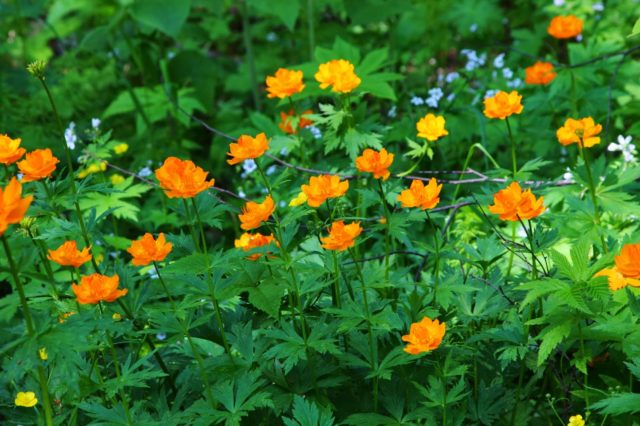
Simultaneously with watering, weeding of weeds and loosening of the soil are recommended to prevent stagnation of water
Preparation for wintering
The Asian swimsuit is a real Siberian. The ornamental culture is characterized by stable frost resistance. No frying is required for winter shelter.
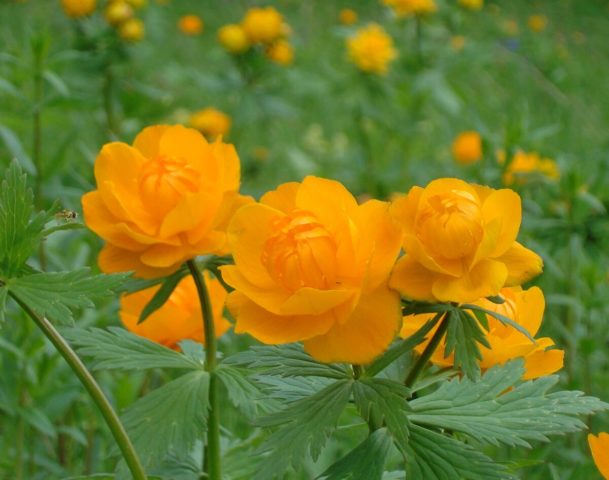
In October, dry leaves and shoots should be cut to a height of 3 cm from the ground
Diseases and pests
Garden frying is characterized by a stable immunity to pathogens of various fungal, bacterial and infectious diseases. In rare cases, the bushes of an Asian swimsuit can attack:
- Septoria - a fungal disease, which is manifested by the presence of light spots with a dark border on the leaf plates.
To combat septoria on plants, modern fungicides should be used.
- Smut, it appears as dark spots (fungal spores) on the ground parts of the ornamental culture.
Smut disease disrupts metabolism, provokes plant death
- Short-bodied nematode - the main pest that parasitizes on the root system of the Asian fire.
Insecticide treatment (Nematodos) allows you to get rid of parasites
Beneficial features
The beneficial properties of the Asian swimsuit are explained by the unique natural composition of the biomass:
- flavonoids;
- phenol carboxylic acids;
- sapronins;
- carotene;
- choline;
- coumarins;
- valuable vitamins and minerals.
For medicinal purposes, aerial parts of the plant (leaves, flowers, seeds) are used.
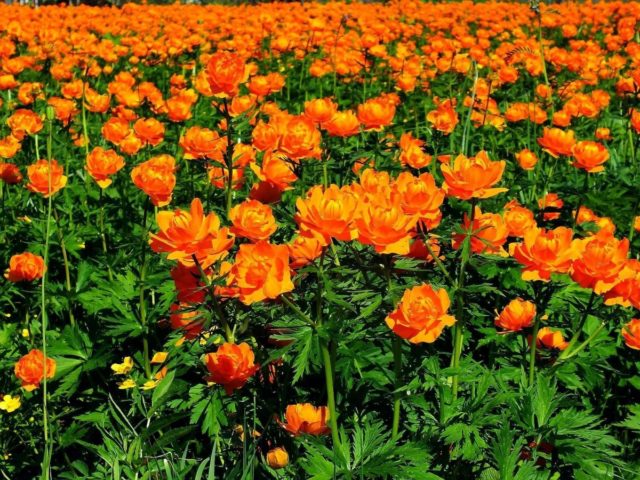
Frying roots are poisonous, so they are rarely used for medicinal purposes.
Application in traditional medicine
The Asian swimsuit is a well-known natural "healer", which is characterized by a huge number of healing properties:
- restoration of vision;
- treatment of menstrual irregularities;
- treatment of disorders of the digestive system;
- treatment of blood diseases;
- anti-inflammatory;
- antineoplastic;
- tonic;
- decongestant;
- diuretic;
- antiscorbutic action.
Handbooks of traditional medicine contain many recipes for ointments, infusions, decoctions from leaves, flowers, seeds of the stems of Asian lights.
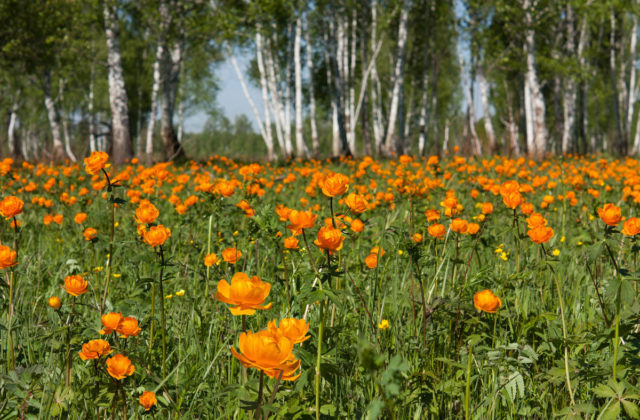
Frying is used to treat domestic animals (processing the udder of cows with decoction of stems)
Limitations and contraindications
In some cases, using an Asian swimsuit can cause side effects. The most dangerous are lesions of the central nervous system, allergic reactions, individual intolerance.
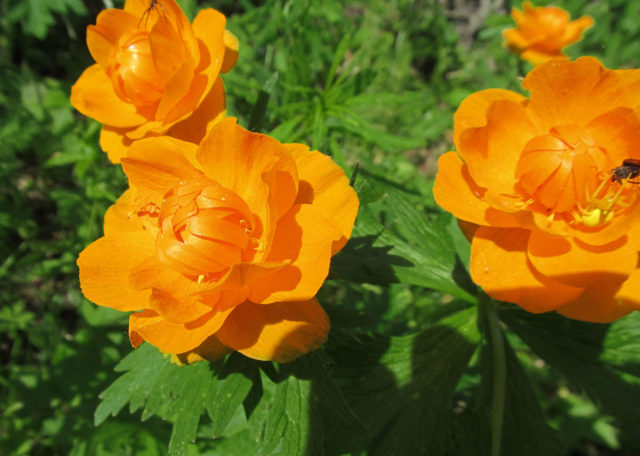
In practice, the composition of the biomass of the swimsuit has not been fully investigated, therefore, it should be used with caution for medicinal purposes.
Conclusion
The Asian bather is a very beautiful ornamental plant that can bring bright colors to any garden. An unpretentious, frost-resistant culture is characterized by stable and very abundant budding for 5-10 years, while requiring minimal maintenance.
